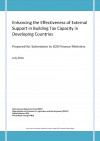In most countries, domestic public finance provides the bulk of the investments needed to achieve the Sustainable Development (SDGs). The Addis Ababa Action Agenda stresses the need for assistance to developing countries to improve their capacity to collect tax and other domestic revenues.
In February 2016, the G20 Finance Ministers called upon the IMF, OECD, UN and World Bank Group to "recommend mechanisms to help ensure effective implementation of technical assistance programmes, and recommend how countries can contribute funding for tax projects and direct technical assistance, and report back with recommendations". The four organisations, working jointly as the members of the new Platform for Collaboration on Tax, developed a series of recommendations and enabling actions in response to this request.
This report seeks to identify core elements of successful tax capacity building programmes, as well as the enabling factors that help to produce such successes. The paper emphasises the need for a supportive political and social environment for reform at the country level to ensure country-led reform is supported by all key stakeholders: leading government officials, political and business leaders, civil society and the citizenry more generally.
The international organisations and G20 countries can help to build this environment through well-designed support for revenue reform initiatives, including through the inclusion of appropriate incentives. Coherent revenue reform strategies are needed as part of development financing plans – as recognised in the Addis Ababa Action Agenda. Co-operation and collaboration among development partners, including Regional Tax Organisations, at the country level will become even more important with the anticipated scaling up of support for work on tax capacity building. Further inclusion of developing countries in international discussions will help to foster the needed consensus for revenue policy and administrative reforms.
The recommendations in this report present an ambitious agenda to be supported by development partners. The report notes that further monitoring and evaluation will be needed to ensure the effectiveness of this support in enabling countries to fulfil their development goals.
